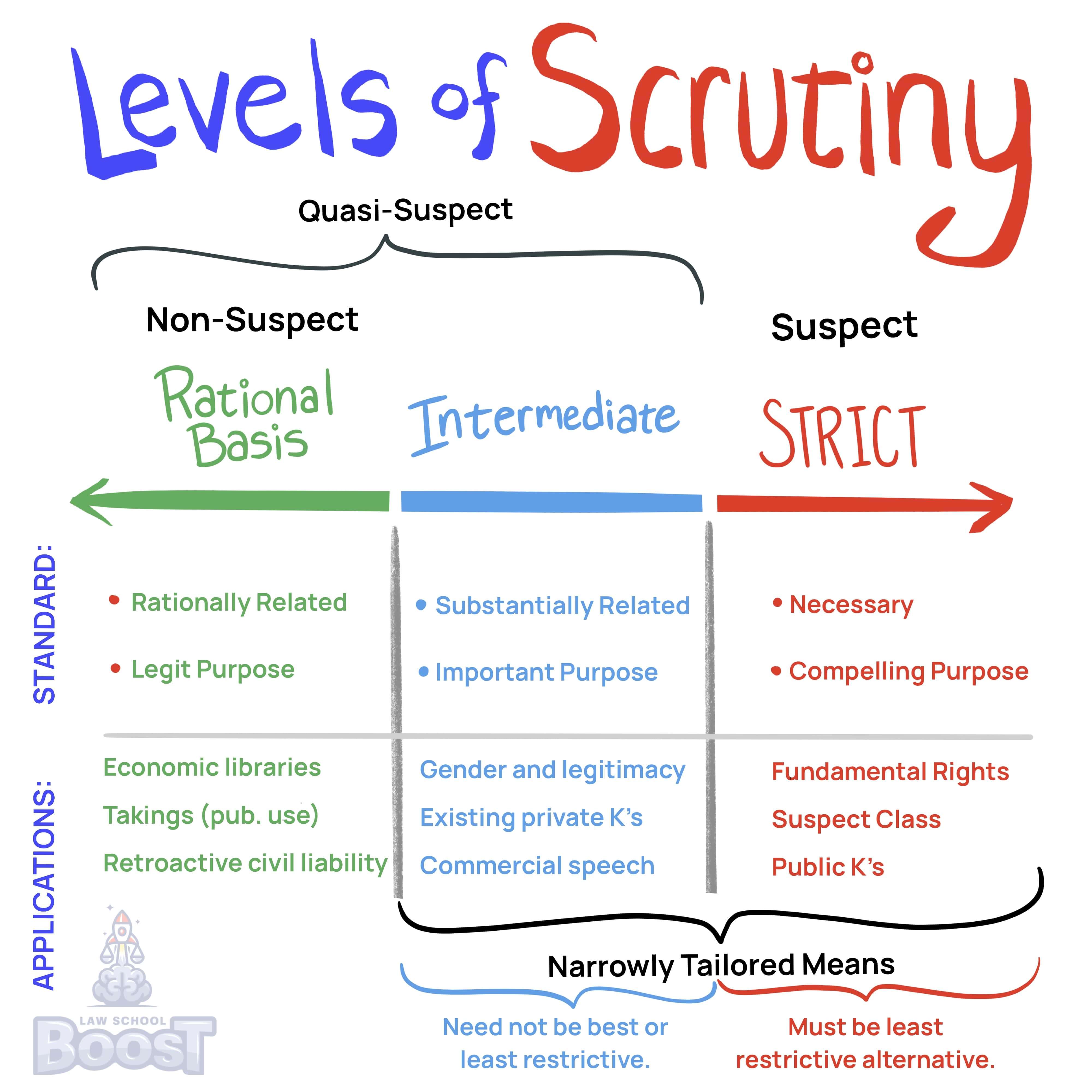🇺🇸
Constitutional Law • Economic Liberties
CONLAW#062
Legal Definition
Economic liberties are only minimally protected, and thus laws affecting them are subject only to the rational basis test.
Plain English Explanation
The Constitution protects core individual liberties like freedom of speech, religion, and privacy very strongly. But economic liberties like the right to contract, do business, or work in an occupation get much weaker protection.
Laws that limit economic freedoms will be upheld as long as they have some rational relationship to a legitimate government purpose. For example, a law requiring licenses for certain professions might be upheld if licensing helps protect public safety. The link between the law and the goal does not have to be very close or narrow.
Courts give extreme deference to the legislature when economic liberties are at stake. Unlike fundamental rights, there is no need to use the least restrictive means. The government just needs to show some logical reason for the law, even if it's loose or debatable.
Laws that limit economic freedoms will be upheld as long as they have some rational relationship to a legitimate government purpose. For example, a law requiring licenses for certain professions might be upheld if licensing helps protect public safety. The link between the law and the goal does not have to be very close or narrow.
Courts give extreme deference to the legislature when economic liberties are at stake. Unlike fundamental rights, there is no need to use the least restrictive means. The government just needs to show some logical reason for the law, even if it's loose or debatable.
Hypothetical
Hypo 1: Bob opens a restaurant in Hypofornia that specializes in extremely spicy dishes. The state passes a law specifically targeting restaurants like Bob's, requiring them to post large, unattractive warning signs about the health risks of consuming spicy food. Bob believes this law unfairly targets his business model and sues the state, claiming the law violates his Equal Protection rights under the Constitution by singling out spicy food restaurants without a sufficient justification. Result: The court applies the rational basis test to evaluate the constitutional claim. It finds that the state has a legitimate interest in protecting public health, and the law is not arbitrary or discriminatory in an unconstitutional way. The requirement for a warning sign, although a burden for Bob's restaurant, is upheld because it is rationally related to the state's legitimate objective.
Hypo 2: Bob's bookstore that features daily live hardcore metal bands is required by a local Hypofornia ordinance to close by 8 p.m. to reduce neighborhood noise. Bob sues the city, claiming the ordinance violates his Due Process rights under the 14th Amendment by arbitrarily restricting his business operations without a fair reason. Result: Applying the rational basis test, the court finds that the city has a legitimate interest in reducing noise for the welfare of its residents. The ordinance is not found to be arbitrary or unreasonable; therefore, it does not violate Bob's Due Process rights. The early closure requirement for the bookstore is upheld as it is rationally related to a legitimate governmental goal.
Hypo 3: Bob operates a food truck in Hypofornia, selling a variety of fusion cuisine. Hypofornia passes a law that bans food trucks from operating within 2 miles of any public school, purportedly to protect students' health by limiting their access to fast food. However, the law exempts fast food restaurants located within the same radius. Bob sues, arguing that the law irrationally targets food trucks while allowing similar businesses to operate, thus violating his Equal Protection rights under the Constitution. Result: The court finds that the law does not have a rational basis because it arbitrarily discriminates against food trucks without a valid public health justification, as it allows similarly situated fast food restaurants to operate near schools. The law is struck down for failing to meet even the minimal rational basis standard, showing that laws must have some logical connection to their stated goals.
Hypo 2: Bob's bookstore that features daily live hardcore metal bands is required by a local Hypofornia ordinance to close by 8 p.m. to reduce neighborhood noise. Bob sues the city, claiming the ordinance violates his Due Process rights under the 14th Amendment by arbitrarily restricting his business operations without a fair reason. Result: Applying the rational basis test, the court finds that the city has a legitimate interest in reducing noise for the welfare of its residents. The ordinance is not found to be arbitrary or unreasonable; therefore, it does not violate Bob's Due Process rights. The early closure requirement for the bookstore is upheld as it is rationally related to a legitimate governmental goal.
Hypo 3: Bob operates a food truck in Hypofornia, selling a variety of fusion cuisine. Hypofornia passes a law that bans food trucks from operating within 2 miles of any public school, purportedly to protect students' health by limiting their access to fast food. However, the law exempts fast food restaurants located within the same radius. Bob sues, arguing that the law irrationally targets food trucks while allowing similar businesses to operate, thus violating his Equal Protection rights under the Constitution. Result: The court finds that the law does not have a rational basis because it arbitrarily discriminates against food trucks without a valid public health justification, as it allows similarly situated fast food restaurants to operate near schools. The law is struck down for failing to meet even the minimal rational basis standard, showing that laws must have some logical connection to their stated goals.
Visual Aids



